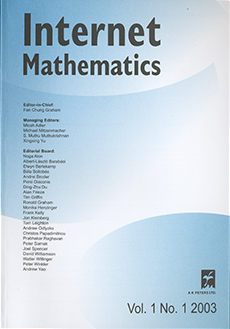Mechanism design seeks algorithms whose inputs are provided by selfish agents who would lie if it were to their advantage. Incentive-compatible mechanisms compel the agents to tell the truth by making it in their self-interest to do so. Often, as in combinatorial auctions, such mechanisms involve the solution of NP-hard problems. Unfortunately, approximation algorithms typically destroy incentive compatibility. Randomized rounding is a commonly used technique for designing approximation algorithms. We devise a version of randomized rounding that is incentive-compatible, giving a truthful mechanism for combinatorial auctions with single parameter agents (e.g., "single minded bidders'') that approximately maximizes the social value of the auction. We discuss two orthogonal notions of truthfulness for a randomized mechanism---truthfulness with high probability and in expectation---and give a mechanism that achieves both simultaneously.
We consider combinatorial auctions where multiple copies of many different items are on sale, and each bidder i desires a subset $S_i$. Given a set of bids, the problem of finding the allocation of items that maximizes total valuation is the well-known SetPacking problem. This problem is NP-hard, but for the case of items with many identical copies, the optimum can be approximated very well. To turn this approximation algorithm into a truthful auction mechanism, we overcome two problems: We show how to make the allocation algorithm monotone, and give a method to compute the appropriate payments efficiently.




